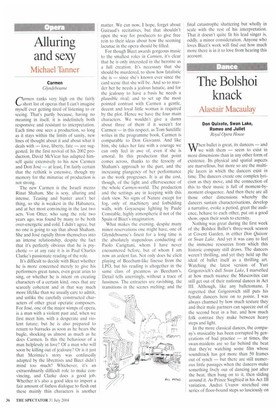Alluring and sexy
Michael Tanner
Carmen Glynclebourne
Cannen ranks very high on the fairly short list of operas that I can't imagine myself ever getting tired of listening to or seeing. That's partly because, having no meaning in itself, it is indefinitely both responsive and resistant to interpretation. Each time one sees a production, so long as it stays within the limits of sanity, new lines of thought about it and about what it deals with — love, liberty, fate — are suggested. In the first revival of his 2002 production, David McVicar has adapted himself quite extensively to his new Carmen and Don Jose — at least, I'm fairly certain that the rethink is extensive, though my memory for the minutiae of production is not strong.
The new Carmen is the Israeli mezzo Rinat Shaham. She is sexy, alluring and intense. Teasing and banter aren't her thing, so she is weakest in the Habanera, and at her most convincing in the last two acts. Von Otter, who sang the role two years ago, was found by many to be both over-energetic and cold. I didn't agree, but no one is going to say that about Shaham. She and Jose rapidly throw themselves into an intense relationship, despite the fact that it's perfectly obvious that he is psychotic — at any rate it is in Paul Charles Clarke's passionate reading of the role.
It's difficult to decide with Bizet whether he is more concerned merely to give his performers great tunes, even great arias to sing, or whether he is intent on creating characters of a certain kind, ones that are scarcely coherent and in that way much more lifelike than we usually care to admit, and unlike the carefully constructed characters of other great operatic composers. For Jose, one of the major wimps of opera, is a man with a violent past and, when we first meet him, with a desperate and violent future; but he is also prepared to return to barracks as soon as he hears the bugle, shocking us almost as much as he does Carmen. Is this the behaviour of a man helplessly in love? Of a man who will soon be killing out of jealousy? Or is it just that Merimee's story was confusedly adapted by the librettists and Bizet didn't mind too much? Whichever, it's an extraordinarily difficult role to make convincing, and Clarke does a good job. Whether it's also a good idea to import a fair amount of listless dialogue to flesh out these mainly thin characters is another matter. We can now, I hope, forget about Guiraud's recitatives, but that shouldn't open the way for producers to give free rein to their ideas about how the seeming lacunae in the opera should be filled.
For though Bizet awards gorgeous music to the smallest roles in Carmen, it's clear that he is only interested in the heroine as a full creation. It's necessary that she should be murdered, to show how fatalistic she is — since she's known ever since the card scene that she will be. And so to murder her he needs a jealous lunatic, and for the jealousy to have a basis he needs a plausible rival: and to set up the most pointed contrast with Carmen a gentle, decent and loyal little woman is required by the plot. Hence we have the four main characters. We wouldn't give a damn about three of them if it weren't for Carmen — in this respect, as Tom Sutcliffe writes in the programme book, Carmen is comparable to Don Giovanni. And like him, she takes her fate with a courage we can only feel in awe of, even if she is amoral. In this production that point comes across, thanks to the ferocity of Shaham's approach to the part, and the increasing plangency of her performance as the work progresses. It is at the cost, though, of the light and effervescence of the whole Carmen-world. The production and the settings are in keeping with this dark view. No signs of Nature except for fog, only of machinery and forbidding walls, with Goyaesque lighting by Paule Constable, highly atmospheric if not of the Spain of Bizet's imagination.
What makes the evening, despite many minor reservations one might have, one of Giyndebourne's finest for a long time is the absolutely stupendous conducting of Paolo Carignani. whom I have never encountered before, but of whom I am now an ardent fan. Not only does he elicit playing of Beecham-like finesse from the LPO, but his reading is altogether in the same class of greatness as Beecham's. Detail tells unerringly, without a trace of fussiness. The entractes are ravishing, the transitions in the scenes melting; and the final catastrophe shattering but wholly in scale with the rest of his interpretation. That it doesn't quite fit his lead singer is, oddly, a minor consideration. Anyone who loves Bizet's work will find out how much more there is in it to love from hearing this account.


























































 Previous page
Previous page